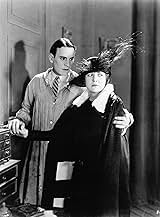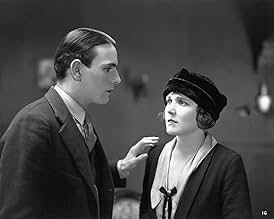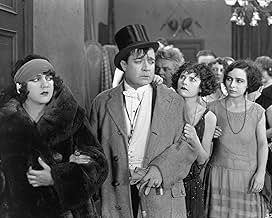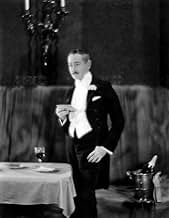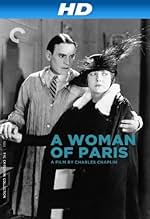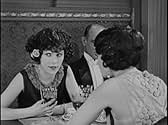IMDb-BEWERTUNG
6,9/10
6619
IHRE BEWERTUNG
Eine Mätresse trifft ihren ehemaligen Verlobten wieder und fühlt sich zwischen Liebe und Bequemlichkeit hin- und hergerissen.Eine Mätresse trifft ihren ehemaligen Verlobten wieder und fühlt sich zwischen Liebe und Bequemlichkeit hin- und hergerissen.Eine Mätresse trifft ihren ehemaligen Verlobten wieder und fühlt sich zwischen Liebe und Bequemlichkeit hin- und hergerissen.
- Auszeichnungen
- 3 wins total
Charles K. French
- Jean's Father
- (as Charles French)
Nellie Bly Baker
- Masseuse
- (Nicht genannt)
Henry Bergman
- Head Waiter
- (Nicht genannt)
Charles Chaplin
- Station Porter
- (Nicht genannt)
Frank Coghlan Jr.
- Boy
- (Nicht genannt)
Antonio Corsi
- Accordion Player
- (Nicht genannt)
Harry d'Abbadie d'Arrast
- Man in Nightclub
- (Nicht genannt)
Stella De Lanti
- Revel's Fiancée
- (Unbestätigt)
- (Nicht genannt)
Jean de Limur
- Man in Nightclub
- (Nicht genannt)
Charles Farrell
- Man in Nightclub
- (Nicht genannt)
Bess Flowers
- Mannequin
- (Nicht genannt)
Empfohlene Bewertungen
Charles Chaplin is noted for his comedy performances, and deservedly.
His direction, though, should be more highly regarded, if only for this one motion picture.
Compare the quality of the photography and the smoothness of the editing to, for example, "The Gold Rush," of about the same time.
"A Woman of Paris" is very modern; "The Gold Rush" is downright primitive (but, in spots, brilliant).
"A Woman of Paris" also shows some admirable acting talent in, really, all the players. Some of the lesser characters are still played beautifully, despite being "lesser," especially Marie's maids and her, more or less, friends, and very especially the masseuse.
And the scene where the artist's mother, played by Lydia Knott, bent on revenge, comes upon Marie -- with no words, just body movement and facial expression -- she tells the audience what the proverbial thousand words could not so well.
Credit for part of that good acting must, of course, go to the director, but even the best director can't make much of poor actors.
Chaplin had very good actors. Adolphe Menjou reached stardom, and deservedly. What a tremendous talent; he could do everything.
Edna Purviance should have achieved much more acclaim. She performed admirably, especially in this movie, and she was attractive. Fame is certainly fickle.
In some ways, "A Woman of Paris" might be written off by a few as "soap opera." But it is well worth watching for the performances and, especially, for the directing.
His direction, though, should be more highly regarded, if only for this one motion picture.
Compare the quality of the photography and the smoothness of the editing to, for example, "The Gold Rush," of about the same time.
"A Woman of Paris" is very modern; "The Gold Rush" is downright primitive (but, in spots, brilliant).
"A Woman of Paris" also shows some admirable acting talent in, really, all the players. Some of the lesser characters are still played beautifully, despite being "lesser," especially Marie's maids and her, more or less, friends, and very especially the masseuse.
And the scene where the artist's mother, played by Lydia Knott, bent on revenge, comes upon Marie -- with no words, just body movement and facial expression -- she tells the audience what the proverbial thousand words could not so well.
Credit for part of that good acting must, of course, go to the director, but even the best director can't make much of poor actors.
Chaplin had very good actors. Adolphe Menjou reached stardom, and deservedly. What a tremendous talent; he could do everything.
Edna Purviance should have achieved much more acclaim. She performed admirably, especially in this movie, and she was attractive. Fame is certainly fickle.
In some ways, "A Woman of Paris" might be written off by a few as "soap opera." But it is well worth watching for the performances and, especially, for the directing.
A Woman Of Paris was an acclaimed success with the critics when it was Originally released on 1st October 1923. However, the audience despised it as they wanted to see Charlie Chaplin the tramp starring in a film not a film directed by Chaplin in which he does not appear (albeit in a small cameo role). When i first saw the film on BBC2 around Christmas 1998 i thought Chaplin had a starring role so was naturally disappointed when i found out this wasn't the case. However, since then i have become a huge fan of Chaplin and all his work so now I think this film is rated among Chaplin's best features. His musical score composed in 1976 with Eric Rogers was Chaplin's last ever work in his film career which spanned 62 years. By 1976 Chaplin was very frail and struggled to communicate so the fact that he could compose the music for a near 80 minute film is amazing and the fact that the music score is as good as any of his other films is also astonishing. Charles Chaplin was a true genius of Cinema and A Woman Of Paris is an excellent example of Chaplin as director, writer and composer.
Fans of Charlie Chaplin flocked to the theaters anticipating a good laugh in his next film, September 1923's "A Woman In Paris." Despite a disclaimer in the beginning of the movie that this was a serious drama, viewers paying to see a comedy were dismayed and disappointed by it. But movie critics loved it, praising its subtleties and emotional depth. As writer David Robinson stated, "Chaplin inaugurated a whole new style of comedy of manners, and new styles of acting to suit it...by revealing the inner workings of his characters' hearts and minds through their external actions and expressions."
Chaplin felt that his regular comedic sidekick, Edna Purviance, who appeared in over 30 of his films since 1915, was becoming too mature of an actress to continue doing slapstick. He wanted to feature her in a serious, dramatic role to illustrate her expressive and sincere yet sober acting abilities. Gleaming a story idea from one of the country's most gold-digging of multi-millionaire wives, Peggy Hopkins Joyce, Chaplin formulated a story on a woman who leaves for Paris on a train after her supposed fiancee doesn't show up at the platform. Marie (Purviance) hooks up with a rich businessman, Pierre (Adolphe Menjou), and lives the life of luxury, until she meets up with her former fiancee. A suicide spices up Chaplin's plot, all derived from Joyce's own personal experiences. The comedian at the time was having a fling with this most interesting Virginian-born woman, Peggy Joyce, whose fangs dug into six very lucrative marriages. She was famous for quotes such as "True love was a heavy diamond bracelet, preferably one that arrived with its price tag intact."
Once the public realized the movie was all serious and lacked a Chaplin presence (he did have a short cameo as a train porter), the chairs in the theaters playing it became empty. Chaplin was forced to pull "A Woman In Paris" prematurely, which, being his first film for his co-ownershipped United Artists, hit the company's bottom line.
Chaplin's original desire to launch a new direction for Purviance fell flat. Not only was the film a failure at the box office, but a New Year's Day incident of 1924 involving a male friend put a crimp on her future acting ambitions. Attending an intimate gathering of three at oil magnate Courtland Dines' apartment with actress Mabel Normand, Purviance witnessed chauffeur Horace Greer (alias Joe Kelley) arrival to pick up Mabel. Conflicting accounts were given as to what happened next: either Greer saw something that hinted Dines being caught in the act with Mabel, or the host unexplicably approaching him angerly waving a wine bottle. Whatever happened, the chauffeur shot Dines three times. Purviance went to the wounded Dines assistance, and for the next 90 minutes tried to staunch the wounds in his bed. Greer drove to the police station to give himself up while the two actresses finally called an ambulance. With Dines refusing to testify during the trial, the jury came back with a not guilty verdict.
The scandal, with all the rumors filling in the blanks, basically slowed Purviance's career to a crawl. She was in one other Chaplin film, 'A Woman of the Sea,' which the unhappy director destroyed, and a 1927 French film. Her two uncredited parts in Chaplin's later movies were her swan songs of the secretary who turned into a movie actress. She received a small monthly salary from Chaplin for the remainder of her life. When she passed away in 1958 at 62, Chaplin, who appeared in over 30 movies with the actress, said "How could I forget Edna? She was with me when it all began."
Chaplin felt that his regular comedic sidekick, Edna Purviance, who appeared in over 30 of his films since 1915, was becoming too mature of an actress to continue doing slapstick. He wanted to feature her in a serious, dramatic role to illustrate her expressive and sincere yet sober acting abilities. Gleaming a story idea from one of the country's most gold-digging of multi-millionaire wives, Peggy Hopkins Joyce, Chaplin formulated a story on a woman who leaves for Paris on a train after her supposed fiancee doesn't show up at the platform. Marie (Purviance) hooks up with a rich businessman, Pierre (Adolphe Menjou), and lives the life of luxury, until she meets up with her former fiancee. A suicide spices up Chaplin's plot, all derived from Joyce's own personal experiences. The comedian at the time was having a fling with this most interesting Virginian-born woman, Peggy Joyce, whose fangs dug into six very lucrative marriages. She was famous for quotes such as "True love was a heavy diamond bracelet, preferably one that arrived with its price tag intact."
Once the public realized the movie was all serious and lacked a Chaplin presence (he did have a short cameo as a train porter), the chairs in the theaters playing it became empty. Chaplin was forced to pull "A Woman In Paris" prematurely, which, being his first film for his co-ownershipped United Artists, hit the company's bottom line.
Chaplin's original desire to launch a new direction for Purviance fell flat. Not only was the film a failure at the box office, but a New Year's Day incident of 1924 involving a male friend put a crimp on her future acting ambitions. Attending an intimate gathering of three at oil magnate Courtland Dines' apartment with actress Mabel Normand, Purviance witnessed chauffeur Horace Greer (alias Joe Kelley) arrival to pick up Mabel. Conflicting accounts were given as to what happened next: either Greer saw something that hinted Dines being caught in the act with Mabel, or the host unexplicably approaching him angerly waving a wine bottle. Whatever happened, the chauffeur shot Dines three times. Purviance went to the wounded Dines assistance, and for the next 90 minutes tried to staunch the wounds in his bed. Greer drove to the police station to give himself up while the two actresses finally called an ambulance. With Dines refusing to testify during the trial, the jury came back with a not guilty verdict.
The scandal, with all the rumors filling in the blanks, basically slowed Purviance's career to a crawl. She was in one other Chaplin film, 'A Woman of the Sea,' which the unhappy director destroyed, and a 1927 French film. Her two uncredited parts in Chaplin's later movies were her swan songs of the secretary who turned into a movie actress. She received a small monthly salary from Chaplin for the remainder of her life. When she passed away in 1958 at 62, Chaplin, who appeared in over 30 movies with the actress, said "How could I forget Edna? She was with me when it all began."
If nothing else, you have to give Charlie Chaplin a lot of credit for taking a shot at something so different from his usual fare. (Though he himself only appears on-screen for a few seconds this time, he did almost everything else in the production.) And while "A Woman of Paris" is certainly a cut below his comedy features, it's a pretty good melodrama, and you'd have to think that with experience Chaplin could have gone on to become almost as effective with straight melodrama as he was with his sentimental comedies. It's not really surprising that after this he returned to comedy for good, but that was just to keep audiences happy, not because he couldn't do drama, since this is a decent effort.
Chaplin's own frequent lady Edna Purviance is convincing as the young woman whose tangled love affairs pull her away from her true love and into a set of tangled relationships in the empty, decadent world of the Parisian idle classes. Except for being rather contrived - there are far too many coincidences and pat developments in the plot, and they do not work as well in serious drama as they would in a comedy - the story is interesting and fairly creative. It does get a bit heavy at times, since there is very little comic relief, but Adolphe Menjou helps keep it from getting unbearably serious with a good performance as the carefree, irresponsible Pierre. He shows that even without dialogue he can make this kind of character lively and memorable.
Since it doesn't quite measure up to the standard of either the best Chaplin features or the best silent melodramas, "A Woman of Paris" may not have a niche of its own, except for its historical interest. But it's quite an interesting change of pace from Chaplin, and an above average movie that's worth seeing.
Chaplin's own frequent lady Edna Purviance is convincing as the young woman whose tangled love affairs pull her away from her true love and into a set of tangled relationships in the empty, decadent world of the Parisian idle classes. Except for being rather contrived - there are far too many coincidences and pat developments in the plot, and they do not work as well in serious drama as they would in a comedy - the story is interesting and fairly creative. It does get a bit heavy at times, since there is very little comic relief, but Adolphe Menjou helps keep it from getting unbearably serious with a good performance as the carefree, irresponsible Pierre. He shows that even without dialogue he can make this kind of character lively and memorable.
Since it doesn't quite measure up to the standard of either the best Chaplin features or the best silent melodramas, "A Woman of Paris" may not have a niche of its own, except for its historical interest. But it's quite an interesting change of pace from Chaplin, and an above average movie that's worth seeing.
'A Woman of Paris' is rather a curiosity in Charles Chaplin's filmography. It stands as the only pure drama he wrote and directed. The film he made just to help foster Edna Purviance's career independent from him. This film was Edna's first and practically the last leading role ('A Woman of the Sea' from 1926 was never released and is now considered to be lost), which, of course, is a pity, because besides being gorgeous, she was a fine actress, and was able to shine on her own not only as of the sidekick of The Tramp. The complex role Marie St. Clair proved that. The film itself was a failure at cinemas not because it was bad (critics at that time liked it), but because Chaplin wasn't in it (only for a brief cameo - a man carrying the box in the trainstation). And it was, oh the horror! a drama.
I guess that's the reason, why Chaplin never tried his hand at a serious movie ever again (although he experimented with quite risky stuff later in his career). That's another pity - because Chaplin truly knew how to create complex characters amid moral turmoils and dilemmas. 'A Woman of Paris' is undoubtedly with flaws. Well, it was practically Chaplin's second feature film and the first time where he ventured that far from his comfort zone.
Altogether, 'A Woman in Paris' is a good drama (probably a bit overly melodramatic by the end), and needs more recognition from Chaplin fans and all silent cinema admirers alike. It really shows that Chaplin was much more diverse and deep as a filmmaker than just offering magnificent laughs.
I guess that's the reason, why Chaplin never tried his hand at a serious movie ever again (although he experimented with quite risky stuff later in his career). That's another pity - because Chaplin truly knew how to create complex characters amid moral turmoils and dilemmas. 'A Woman of Paris' is undoubtedly with flaws. Well, it was practically Chaplin's second feature film and the first time where he ventured that far from his comfort zone.
Altogether, 'A Woman in Paris' is a good drama (probably a bit overly melodramatic by the end), and needs more recognition from Chaplin fans and all silent cinema admirers alike. It really shows that Chaplin was much more diverse and deep as a filmmaker than just offering magnificent laughs.
Wusstest du schon
- WissenswertesThe reissue of this film, with a musical score and new cut by Sir Charles Chaplin, was the last work of his entire film career. By then, the 87-year-old Chaplin was visibly frail but still walking. His score was aided by arranger Eric James, and he took a small theme from Monsieur Verdoux - Der Frauenmörder von Paris (1947), but most of the score was Chaplin's. The film was reissued posthumously in 1977 with the new score to overwhelming critical and public praise. At that time, many critics praised it (as in the trailer) as one of the best films ever made.
- PatzerWhen Jean starts fighting with Pierre in the restaurant, Pierre's glass of wine or champagne gets knocked over. When Pierre sits down on the table afterwards, the glass stands on the table filled with drink as if it hadn't been knocked over.
- Zitate
[Intertitle]: Time heals, and experience teaches that the secret of happiness is in service to others.
- Alternative VersionenDuring 1976, Chaplin was preparing a reissue of A Woman of Paris/Sunnyside but died before completion. The project was completed after his death, and the films were reissued in the United States by Kino International Corp. in 1978. This version, however, dispensed with an opening subtitle, as well as a few brief insert shots.
- VerbindungenFeatured in Chaplin Today: Modern Times (2003)
Top-Auswahl
Melde dich zum Bewerten an und greife auf die Watchlist für personalisierte Empfehlungen zu.
- How long is A Woman of Paris: A Drama of Fate?Powered by Alexa
Details
- Erscheinungsdatum
- Herkunftsland
- Offizieller Standort
- Sprache
- Auch bekannt als
- Eine Frau in Paris
- Drehorte
- Produktionsfirma
- Weitere beteiligte Unternehmen bei IMDbPro anzeigen
Box Office
- Budget
- 351.000 $ (geschätzt)
- Weltweiter Bruttoertrag
- 12.921 $
- Laufzeit1 Stunde 22 Minuten
- Sound-Mix
- Seitenverhältnis
- 1.33 : 1
Zu dieser Seite beitragen
Bearbeitung vorschlagen oder fehlenden Inhalt hinzufügen

Oberste Lücke
By what name was Die Nächte einer schönen Frau (1923) officially released in India in English?
Antwort
